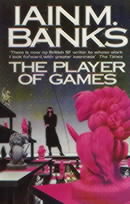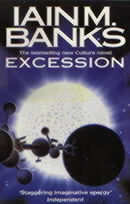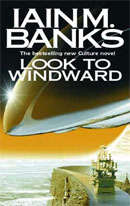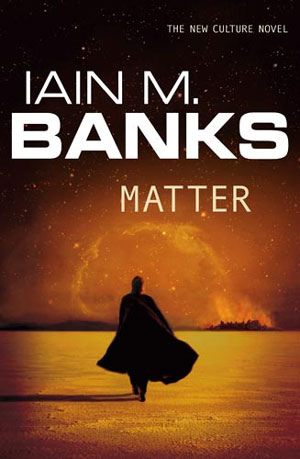

Consider Phlebas was the
first novel I read from whom I now regard as one the greatest
ever science fiction writers of all time. I read the opening of
this novel which is only three pages and instantly to a liking to
Bank's narrative and style. The story begins in a time of
interstellar conflict between the alien Idirans and the Human
Culture. War has raged for decades and the conflict
involves a genetically modified human called Horza who can alter
his physical appearance and is working for the Idirans. However, an
artificial mind which eluded the Idirans and destruction
crash landed on the planet Schar’s World’s, whose
owners allow restricted limits to offworlders. Horza has been to
Schar’s World as part of a Changer team and has some local
knowledge of the maze like system where the escaped AI may
reside. The Culture cannot allow this AI to fall into the Idirans
hands set upon stopping him. This novel is a masterpiece which
had me rooting for different sides and persons throughout the
beginning, middle and end. It is a haunting, evocative, at times
funny novel which should take a place of pride on your
bookshelf.



The second book in the
culture sequence The Player Of Games is yet another masterstroke
by Iain M. Banks. The Culture is a utopia to live in, and although
almost every conceivable whim and fetish can be and is usually
catered for, life lacks any challenge. Jernau Gurgeh is a
gamesplayer without equal in the culture, and it is this unique
ability which will bring a new meaning to his existence. He is
offered to play a game tournament at the Empire of Azad located
in a neighbouring galaxy. This Empire however is
expansionist, intolerably cruel to its vanquished foes and views
itself as the epitome of civilization. The game Jernau Gurgeh must
learn reflects Azad and is a cornerstone of Azadian life and
superiority over all others. The game is so unbelievably difficult
to learn and impossible to master that even the AIs that
accompany Jernau Gurgeh are unable to truly master it, unbelievable
as that may sound. One final note - win the game and you become
Emperor Of Azad. Can and will Jernau Gurgeh be able to achieve
that lofty status?.



Cheradenine is an
ex-"special circumstance" agent who had been raised to
eminence by a woman named Diziet. Skaffen-Amtskaw, the drone, had
saved her life and it believes Cheradenine to be a burnt-out
case. But not even its machine intelligence can see the horrors
in his past. Right from the beginning this books grabs your
attention and refuses to let go. It contains a lot of strange
scenarios varying from a decapitation scene which rather than
horrify its readers is both funny and sad to a war being fought
on icebergs. It is a novel which will tear away the
veneer of so called human civility and expose us for dark animals
that with boundless atavism show up from time to time. The
story line is told from the viewpoint a man working through some
very painful memories with the driven need of Diziet Sma to
protect the man and a wisecracking drone regaling in its
self-assurance and dark past. Brilliant!! Be warned that this
novel has a very bittersweet ending which many may not like.



Two and a half millennia ago, the artefact appeared in a remote
corner of space, beside a trillion-year- old dying sun from a
different universe. It was a perfect black-body sphere, and it
did nothing. Then it disappeared. Now it is back. Silent,
motionless, and resisting all efforts to make contact, the
artefact waits. The Culture ships, however, cannot. For the
artefact is something they need to understand first, before it
falls into less understanding hands - and triggers a political
and military crisis which will threaten everything the Culture
has achieved. One person who saw the artefact when it first
appeared may have information concerning its purpose, but she is
living out her death in the immense Eccentric ship, the Sleeper
Service. The Culture ships formulate a plan to retrieve her. The
Sleeper Service has other things on its mind. The AIs (Minds) which
run the star ships in this novel are the stars of this novel
without one iota of doubt. The remarks made from one ship to
another throughout this novel are a joy to behold. The Human
element of this novel although not secondary is overshadowed by
the Minds and their internal wrangling. Not banks at his very
best but still a worthy addition to the culture series.



Inversions is another
novel set in the culture series and here we find the all the
action taking place on one planet. You will not find a single page
with reference to the culture. The reason for this is that that
Inversions takes place on a medieval planet with two kingdoms at
loggerheads with each other. The King's personal physician who
is both a woman and an agent of the culture and a male
bodyguard/soldier who serves the more forward thinking
"Protector" are the central characters of this
novel. The physician is a bit of a mystery who does her best to
ease the suffering of those she encounters, whilst the bodyguard
is in personal turmoil with one of the concubines of his
master. Inversions is not what I would truly describe as science
fiction as I believe that science fiction must use technology as
a metaphor in some sense. It's a gripe of mine and I believe
like many others that Inversions is fantasy dressed in science
fiction clothing. Only read or buy if already familiar with the
culture sequence.



It was one of the less
glorious incidents of the Idiran wars that led to the destruction
of two suns and the billions of lives they supported. Now, 800
years later, the light from the first of those deaths has reached
the Culture's Masaq' Orbital. A Chelgrian emissary is
dispatched to the Culture. After having finished reading Look To
Windward I realised Iain M. Banks is back to his best. This novel
centres on three characters without ever losing its flow or
forcing together matters to come to ahead right until the
end. Firstly Quilan, a man sent on one last covert mission, a man
who wants it badly to be his last. Secondly Mahrai Ziller, the
greatest composer whose latest piece of music is a commemoration
of the unwarranted destruction of those two suns. Lastly, the Masaq
Orbital's Hub itself which forever in control seeks to move
on. This novel is slow paced page-turner which won't overtax
your heart or drain your adrenal glands but will gently rap on
you brain for some time to come.



Against A Dark Background
sees once again sees Iain M .Banks doing what he does best. The
heroine of this epic is a Sharrow once the leader of a
personality-attuned combat team who in what can only be described
as the unluckiest break a gal can get is wanted dead by a
religious cult called the Huhsz. They believe that Sharrow's
death will bring about their faith’s apotheosis. What's
a girl to do? Well Sharrow is nobody's fool or fodder and she sets
upon the task of bringing back together her old combat team and
finding some really badass weapons, serious apocalyptic badass
weapons known as Lazy Guns to her aid. This novel spans the
Golterian system with all manner of chases, explosions,
traps, murders, subterfuge, horror and hope typical of Iain M.
Banks. Menacing and brilliant.



Seer Fassin Taak has very unique and prestigious position within the Ulubis
system. His very long life is split between communicating and living with the
Dwellers inside the gas giant Nasqueron and living a fulfilling life amongst
his own kind. The Dwellers are to all accounts the first evolved and sentient
space faring species around and live extraordinary long lives. They view other
species to whom they patronizingly call the "Quick" as nothing more interesting
than a mayfly. Fassin Taak and humanity is one of a long line of species which
has communicated-(delved)-to understand the Dwellers and this task is almost
always seemingly an exercise in futility. It emerges however through a secret
military session in which Fassin Taak is attending that the Ulubis system is
going to be attacked by a fleet commanded by the Archimandrite Luseferous, "That
most deplorable of beings, a psychopathic sadist with a fertile imagination". The
expected assault on Ulubis is due in less than two decades and this coincides with
a period of terrorist activity by the "Beyonders" against Ulubis and it war production
facilities. To come to light amidst this shocking news is that one of the pieces of
information Fassin Taak retrieved decades earlier from the Dwellers is thought to reveal
that most unquestioning of all things "The List". This is meant to pertain to the faster than
light travel throughout the known galaxy which the mythical Dwellers only have access to.
Fassin Taak is now elevated to a higher station and ordered to return to Nasqueron and
obtain more information relating to this list. From this point on things get interesting.
This novel weighing in at five hundred forty four pages certainly demands your attention
as the list of characters minor and major make sudden and expected appearances along with
all to sudden deaths and unknowing fates. A novel at times which seems to have all the pace of
tectonic plate movement, rewards the readers for their patience but which at times
is so descriptive and occasionally verbose that it seems Banks just felt flexing his literary
skills in describing the feelings of those affected by the oncoming war. When Banks allowed
this novel to flow it was typical Banks flair enriched with fear, desperation, humour, hope and
horror. The actual mythical algebraic equation which is the crux of Fassin Taak's journey is
eventually explained and in typical style of Banks it was worth finding out. His character portrayal
was a little unevenly distributed ranging from Luseferous psychotic view of people and the galaxy
and the treatment of those who cross him and fail, to Fassin Taak's single-minded pursuit of
the List. If you have the patience this is a rewarding read.



Synopsis
In a world renowned within a galaxy full of wonders, a crime within a war. For one
brother it means a desperate flight, and a search for the one - maybe two - people
who could clear his name. For his brother it means a life lived under constant threat
of treachery and murder. And for their sister, it means returning to a place she'd
thought abandoned forever. Only the sister is not what she once was; Djan Seriy
Anaplian has become an agent of the Culture's Special Circumstances section, charged
with high-level interference in civilisations throughout the greater galaxy. Concealing
her new identity - and her particular set of abilities - might be a dangerous strategy.
In the world to which Anaplian returns, nothing is quite as it seems; and determining
the appropriate level of interference in someone else's war is never a simple matter.
Matter is Iain M. Bank's first failing as a science fiction writer. I simply could
not believe he created this rather turgid piece of literature. The storyline is
blasť, the narrative very flowery, the descriptive nature of the shellworld where
most of the story takes place seems somewhat lost in an antiquity. The highly evolved
yet strangely bucolic morass of peacefully co-habitating aliens added absolutely
no thrill. Such purple prose - Urgh! At times it felt that Banks was showing off how
intelligent and powerful a writer he truly is: he truly is - but so what? Style over
substance does not cover up the cracks of this woefully under par effort. The characterisations
and AI's and cosmological history of those piecemealed into novel are sufficient
for the framework of a good science fiction novel - but the rest simply does not
follow. The actual ending of the novel (it doesn't even remotely save this latest
piece of fiction from Mr Banks) comes at you from out of nowhere, and that's it!
The pace of this novel is horrendously askew. I suppose even the greats are allowed
to produce one lemon in a lifetime. Damn! This one is so bitter, though.

















